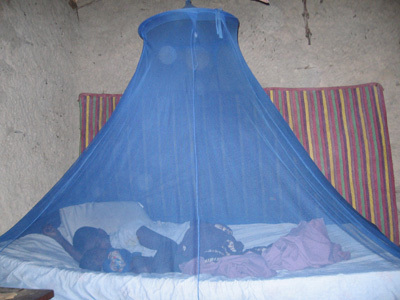What if it was your baby without a mosquito net?
I was always one of the few fortunate ones who had vaccination and a malaria net during my many hot buggy nights in rural villages in Africa.
One of the most troubling facts of everyday routine living is how much of an impact we can have in the world if we were to divert some of our resources and spending to where they were truly needed. For example, malaria is one of the most deadly diseases in Africa and, paradoxically, one of the simplest and cheapest to fight. For the same cost of a $3 cup of coffee, one could have potentially saved a child's life by buying a malaria net.
Over 250 million have been killed in the 20th century by this preventable disease! Tragically, still today over 625,000 people die annually from malaria, of whom nearly 470,000, in 2012, were African children younger than age 5. There are many vaccines and, cheaper simpler alternatives like malaria nets that help, yet every approach is woefully underfunded.
Unfortunately, the fight against Malaria is thousands of years old. Malaria is an ancient disease that has been documented to afflict humanity since at least the beginning of civilization. A 2010 DNA test of King Tutankhamun, who died more than 3,300 years ago, revealed that the young king's death at the age of 19 was likely caused by a combination of necrosis of the foot and malaria contracted by mosquitos. Indeed, the DNA test revealed that King Tut had had multiple malarial infections, including the most deadly of its time, malaria tropica, which still exists. This is the oldest confirmed evidence of malaria in humans.
Malaria, disturbingly, isn't just a disease found in developing countries. In fact, malaria almost had a decisive effect on the early European arrival in North America. Students commonly learn about the Jamestown colony in Virginia and how Captain John Smith supposedly saved the colony from failure by making people work. In reality, the Jamestown colony, while easier to defend as a peninsula, was located in a swampy area, and every year malaria ravaged the colony. Indeed, contemporary accounts noted that newcomers faced a "seasoning" period during which they had to endure malaria and other infectious diseases. Until at least 1624, there was extremely high mortality in the Jamestown area that threatened the colony with failure, in no small part due to malaria.
Today, the World Health Organization (WHO) reports that there are some encouraging signs. Mortality from malaria has dropped by more than 40 percent since 2000, and by nearly half in Africa. This has been accomplished by early diagnosis and treatment, which reduces transmission. Unfortunately, malaria has growing artemisinin resistance in areas of southeast Asia. Prevention can be inexpensive, as an insecticidal net can provide protection for 3-5 years. Indoor spraying of insecticides can greatly reduce malaria for up to half a year if a minimum of 80 percent of homes in a particular area are sprayed.
Nevertheless, malaria threatens 3.4 billion people worldwide, and more than 200 million people are afflicted with malaria annually. In addition, while preventive measures are working better today, it must be noted that some strategies, such as using combination drug therapy, may soon become ineffective as Plasmodium falciparum, the deadliest of malaria strains, becomes more resistant to medications. Professor François H. Nosten, director of the Shoklo Malaria Research Unit, recently proposed a radical solution to eliminate malaria. Professor Nosten has noted that, since many people without symptoms still carry P. falciparum in their bodies, they are carriers, and treating only those who are ill will not eliminate the disease. Instead, Professor Nosten proposes that everyone in large regions should be treated for malaria while treatments still work. Only if everyone is treated will the parasite be eliminated, and since only humans are infected, this will wipe out malaria. This idea is based on similar strategies for the elimination of other diseases such as river blindness. It would take unprecedented cooperation from local populations and an enormous amount of funds, along with leadership from the presently sluggish WHO.
Like all diseases, we must use our resources (personally and collectively) to give immediate and direct assistance to those living with illness while investing in long-term solutions and cures. Professor Nosten has indicated that certain agencies, such as the Bill and Melinda Gates Foundation, are likely to support this strategy. We should encourage our leaders to use their influence at the WHO to move in this novel direction to possibly rid whole world regions of this dreaded scourge.
We must, in our lifetime, eradicate malaria. This is not only a political issue but also a religious and moral one. When Rabbi Chaim of Brisk was asked what the role of a rabbi is, he replied: "To redress the grievances of those who are abandoned and alone, to protect the dignity of the poor, and to save the oppressed from the hands of his oppressor." The work of all spiritual leadership is to carry out the work so beautifully described by Rabbi Chaim.
I cannot imagine living in such a precarious and frightening situation where I would know how to protect myself or my family from such a lethal disease. We must feel the global solidarity and human empathy to truly understand this petrifying reality and to collectively work to eradicate this disease from the earth.
Rabbi Dr. Shmuly Yanklowitz is the Executive Director of the Valley Beit Midrash, the Founder & President of Uri L'Tzedek, the Founder and CEO of The Shamayim V'Aretz Institute and the author of five books on Jewish ethics. Newsweek named Rav Shmuly one of the top 50 rabbis in America."
